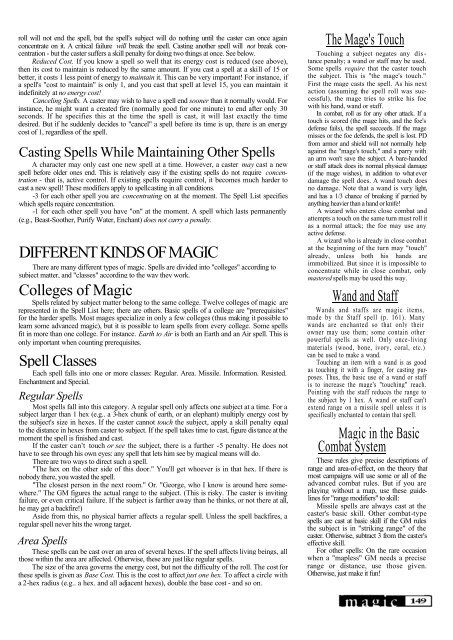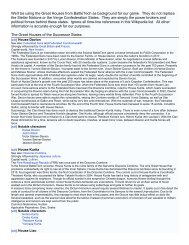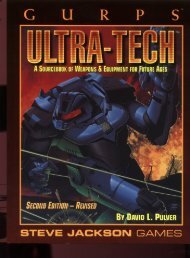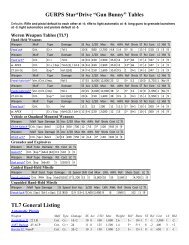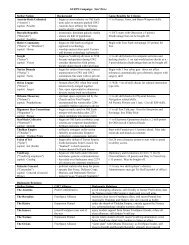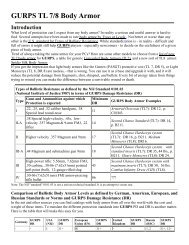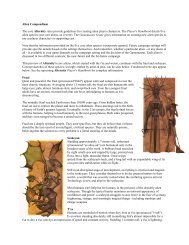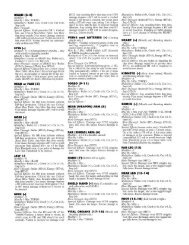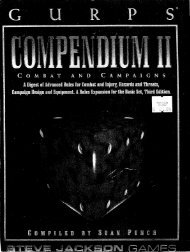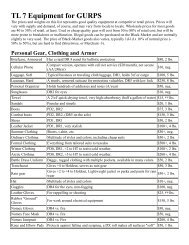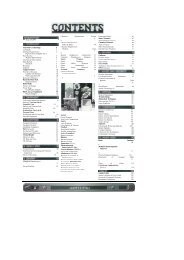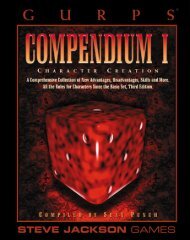oll will not end the spell, but the spell's subject will do nothing until the caster can once againconcentrate on it. A critical failure will break the spell. Casting another spell will not break concentration- but the caster suffers a skill penalty for doing two things at once. See below.Reduced Cost. If you know a spell so well that its energy cost is reduced (see above),then its cost to maintain is reduced by the same amount. If you cast a spell at a skill of 15 orbetter, it costs 1 less point of energy to maintain it. This can be very important! For instance, ifa spell's "cost to maintain" is only 1, and you cast that spell at level 15, you can maintain itindefinitely at no energy cost!Canceling Spells. A caster may wish to have a spell end sooner than it normally would. Forinstance, he might want a created fire (normally good for one minute) to end after only 30seconds. If he specifies this at the time the spell is cast, it will last exactly the timedesired. But if he suddenly decides to "cancel" a spell before its time is up, there is an energycost of 1, regardless of the spell.Casting Spells While Maintaining Other SpellsA character may only cast one new spell at a time. However, a caster may cast a newspell before older ones end. This is relatively easy if the existing spells do not require concentration- that is, active control. If existing spells require control, it becomes much harder tocast a new spell! These modifiers apply to spellcasting in all conditions.-3 for each other spell you are concentrating on at the moment. The Spell List specifieswhich spells require concentration.-1 for each other spell you have "on" at the moment. A spell which lasts permanently(e.g., Beast-Soother, Purify Water, Enchant) does not carry a penalty.DIFFERENT KINDS OF MAGICThere are many different types of magic. Spells are divided into "colleges" according tosubject matter, and "classes" according to the way they work.Colleges of MagicSpells related by subject matter belong to the same college. Twelve colleges of magic arerepresented in the Spell List here; there are others. <strong>Basic</strong> spells of a college are "prerequisites"for the harder spells. Most mages specialize in only a few colleges (thus making it possible tolearn some advanced magic), but it is possible to learn spells from every college. Some spellsfit in more than one college. For instance. Earth to Air is both an Earth and an Air spell. This isonly important when counting prerequisites.Spell ClassesEach spell falls into one or more classes: Regular. Area. Missile. Information. Resisted.Enchantment and Special.Regular SpellsMost spells fall into this category. A regular spell only affects one subject at a time. For asubject larger than 1 hex (e.g.. a 3-hex chunk of earth, or an elephant) multiply energy cost bythe subject's size in hexes. If the caster cannot touch the subject, apply a skill penalty equalto the distance in hexes from caster to subject. If the spell takes time to cast, figure dis tance at themoment the spell is finished and cast.If the caster can't touch or see the subject, there is a further -5 penalty. He does nothave to see through his own eyes: any spell that lets him see by magical means will do.There are two ways to direct such a spell."The hex on the other side of this door." You'll get whoever is in that hex. If there isnobody there, you wasted the spell."The closest person in the next room." Or. "George, who I know is around here somewhere."The GM figures the actual range to the subject. (This is risky. The caster is invitingfailure, or even critical failure. If the subject is farther away than he thinks, or not there at all,he may get a backfire!)Aside from this, no physical barrier affects a regular spell. Unless the spell backfires, aregular spell never hits the wrong target.Area SpellsThese spells can be cast over an area of several hexes. If the spell affects living beings, allthose within the area are affected. Otherwise, these are just like regular spells.The size of the area governs the energy cost, but not the difficulty of the roll. The cost forthese spells is given as Base Cost. This is the cost to affect just one hex. To affect a circle witha 2-hex radius (e.g.. a hex. and all adjacent hexes), double the base cost - and so on.The Mage's TouchTouching a subject negates any distancepenalty; a wand or staff may be used.Some spells require that the caster touchthe subject. This is "the mage's touch."First the mage casts the spell. As his nextaction (assuming the spell roll was successful),the mage tries to strike his foewith his hand, wand or staff.In combat, roll as for any other attack. If atouch is scored (the mage hits, and the foe'sdefense fails), the spell succeeds. If the magemisses or the foe defends, the spell is lost. PDfrom armor and shield will not normally helpagainst the "mage's touch," and a parry withan arm won't save the subject. A bare-handedor staff attack does its normal physical damage(if the mage wishes), in addition to what everdamage the spell does. A wand touch doesno damage. Note that a wand is very light,and has a 1/3 chance of breaking if parried byanything heavier than a hand or knife!A wizard who enters close combat andattempts a touch on the same turn must roll itas a normal attack; the foe may use anyactive defense.A wizard who is already in close combatat the beginning of the turn may "touch"already, unless both his hands areimmobilized. But since it is impossible toconcentrate while in close combat, onlymastered spells may be used this way.Wand and StaffWands and staffs are magic items,made by the Staff spell (p. 161). Manywands are enchanted so that only theirowner may use them; some contain otherpowerful spells as well. Only once-livingmaterials (wood, bone, ivory, coral, etc.)can be used to make a wand.Touching an item with a wand is as goodas touching it with a finger, for casting purposes.Thus, the basic use of a wand or staffis to increase the mage's "touching" reach.Pointing with the staff reduces the range tothe subject by 1 hex. A wand or staff can'textend range on a missile spell unless it isspecifically enchanted to contain that spell.Magic in the <strong>Basic</strong>Combat SystemThese rules give precise descriptions ofrange and area-of-effect, on the theory thatmost campaigns will use some or all of theadvanced combat rules. But if you areplaying without a map, use these guidelinesfor "range modifiers" to skill:Missile spells are always cast at thecaster's basic skill. Other combat-typespells are cast at basic skill if the GM rulesthe subject is in "striking range" of thecaster. Otherwise, subtract 3 from the caster'seffective skill.For other spells: On the rare occasionwhen a "mapless" GM needs a preciserange or distance, use those given.Otherwise, just make it fun!
Some spells have a very low base cost - e.g., 1/10 of a point for Rain. You must spend a minimumof 1 point on these spells. You may choose to affect only a part of the area, rather than thewhole circle, but the cost is still the same.If the caster cannot touch some part of the affected area, the skill penalty is equal to thedistance, in hexes, from the caster to the nearest hex of the area.Assume that area spells reach 4 yards up from the ground, except for weather spells.The Area of EffectThe area of effect of an area spell is acircle. Its size depends on the energy putinto the spell. (1) above is a single "ring"of hexes (i.e.. 1 hex). Cost to cast the spellin this area is equal to base cost. (2) is anarea equal to two rings of hexes - the center,and the ring around it. Cost to cast here isdouble base cost. (3) is three rings ofhexes - triple base cost. (4) is four rings -four times base cost. And so on ...Some area spells have a minimum costto cast - e.g., Sense Foes has a base cost of1 but a minimum cost to cast of 2 points.This means it will cost 2 to cast, even ifyou choose to restrict it to one hex.Hints for SpellcastingSeveral small spells can often be betterthan one big one. If you know the Fog spellwell, you could cast several individualhexes of fog at little or no cost - but a largearea would cost you several energy points.Furthermore, if you cast several spells insuccession, you can enter each hex and castthe spell around you. avoiding any penaltyfor distance. And, of course, a small spellwastes less energy if it fails. Large, quickspells are best saved for emergencies.Banged Attack ModifiersMissile spell attacks are treated as"ranged weapons" (pp. 100, 114-119) forall purposes. Ranges for these spells are:Stone Missile: SS 13, Acc +2, 1/2D 40,Max 80.Lightning: SS 13. Acc +3, 1/2D 50, Max100.Fireball: SS 13, Acc +1, 1/2D 25, Max50.Ice Sphere: SS 13, Acc +2. 1/2D 40.Max 80.Limits on ProtectionSeveral spells (Blur, for instance) offervariable levels of protection. In all suchcases, the most protection anyone can getfrom these spells, whether from one caster orseveral, is 5 points' worth.If the same protective spell is thrownmore than once on the same subject, only thestrongest one takes effect; they do not addtogether. The same is true for attack spellsthat reduce the subject's attributes.Missile SpellsCertain long-distance attacks (Fireball, Lightning, etc.) are "missile spells." These spellsrequire two skill rolls. The first is the regular skill roll to determine whether the spell succeeds;this is made when you start the spell, with no modifier for distance. The second is a roll on thecaster's Throwing or Spell Throwing skill (p. 244), made when the spell is thrown, to seewhether it hits its target! Figure this like any other ranged attack, taking into account the target'ssize, speed and range.A missile spell flies in a straight line. If it hits a physical barrier and breaks that barrier, itsremaining power continues through. An accurately-thrown missile spell may be blocked ordodged - but not parried. If the defender fails his defense roll, the spell takes effect. Armordoes protect against damage from missile spells.The strength of a missile spell depends on the energy put into it. For instance, a fireball does1 die of damage for each point of energy used in creating it.Time to prepare a missile spell depends on the energy put into it; each turn gives it 1 point ofenergy. The caster concentrates for a turn, and then tries his spell roll at the beginning of his newturn. If he succeeds, the missile has 1 point of energy and can be thrown on that turn. Or he canhold it and enlarge it! Another second of concentration gives it another point of energy. A thirdsecond of concentration makes it a 3-point missile - as big as most missiles can get.Thus, a wizard could create and throw a 1-point missile even turn - or a 2-point missile even,second turn - and so on. He may not aim while he is creating the missile: if he is going to aim. hemust take another turn to do so after the missile is created.A wizard may keep a missile spell "in hand" after it is ready to throw. He may move whileholding it. or use the Aim maneuver. He does not have to throw the spell until he wants to. This isthe only sort of spell that can be "held until ready." A wizard cannot cast another spell whileholding a missile spell.If a wizard is injured while he has a missile "in hand." he must roll vs. Will. If he fails, heloses control of the missile. A solid missile will simply fall to the floor, but other missiles(fireballs, etc.) will immediately affect the caster!Information SpellsAn "information" spell is cast to gain knowledge. Some information spells require that thesubject be touched by the caster. Modifiers for each information spell are given in the Spell List.When an information spell is cast, the player doesn't make the roll. The GM rolls. in secret. If thespell succeeds, the GM gives the caster the desired information - the better the roll, the moreinformation. If the spell fails, the caster is told. "You sense nothing." On a critical failure, the GMlies to the player.Therefore, the caster always pays the full energy cost for each information spell - he does notknow whether it succeeded or not. Most information spells can only be tried once per day by eachcaster (or group)! "Seek" spells are an exception to this.Most information spells are less likely to succeed if the subject is a long distance away; seesidebar, p. 151. for long-distance modifiers.Resisted SpellsCertain spells may be resisted. These are noted on the Spell List. When such a spell is cast, itworks automatically only on a critical success. If it "merely" succeeds, use a "quick contest"procedure to see whether the spell overcomes the subject's resistance. (The subject is alwaysaware that something is happening, and has a chance to resist. But he does not have to resist if hedoesn't want to, even if he has Magic Resistance.')In a "resisted" situation, the caster first tries his skill roll. If he fails, he fails, and the subjectnotices nothing. If he succeeds, note how much he succeeded by. For example, a roll of 6, when a13 was needed, succeeds by 7 points. If the subject is a living creature, the caster rolls against a16 or the subject's actual resistance, whichever is higher, if his effective skill is over 16 and thesubject is a living creature: thus, "automatic victory over resistance" is impossible. If the subjectis a spell, there is no limit on the caster's effective skill! Note that if the subject has MagicResistance (p. 21). it always affects this roll, even if the subject is willing.The subject may then try a resistance roll. A living subject may resist a combat spell withIQ. ST. DX or HT. depending on the attacking spell. Strong Will always adds to resistance: WeakWill always subtracts. The subject's Magic Resistance, if any. adds to his resistance. It countsdouble against area spells only. For instance. Magic Resistance 1 adds 1 to resistance of Sleep, or2 to Mass Sleep.
- Page 3 and 4:
17. FLIGHT.........................
- Page 5 and 6:
Materials Needed for PlayThe GURPS
- Page 7 and 8:
WHAT IS ROLEPLAYING?A roleplaying g
- Page 9 and 10:
Character TypesThere are no "charac
- Page 12 and 13:
Four numbers called "attributes" ar
- Page 14 and 15:
You are free to set the physical ap
- Page 16 and 17:
REPUTATIONSome characters are so we
- Page 18 and 19:
These are character traits that are
- Page 20 and 21:
Legal Enforcement Powers 5, 10 or 1
- Page 22 and 23:
Rapid Healing5 pointsThis advantage
- Page 24 and 25:
A minor deity as Patron to a travel
- Page 26 and 27:
ReputationVariable (see p. 17)Socia
- Page 28 and 29:
Lame-15,-25, or -35 pointsYou have
- Page 30 and 31:
Bad Temper-10 pointsYou are not in
- Page 32 and 33:
Dyslexia-5 or -15 pointsYou have a
- Page 34 and 35:
Pacifism-15 or -30 pointsYou are op
- Page 36 and 37:
Shyness-5,-10,-15 pointsYou are unc
- Page 38 and 39:
You have a significant responsibili
- Page 40 and 41:
A "quirk" is a minor personality tr
- Page 42 and 43:
SpecializingRequired Specialization
- Page 44 and 45:
MEANING OF SKILL LEVELSSo you have
- Page 46 and 47:
Teamster (Mental/Average)Defaults t
- Page 48 and 49:
Skiing (Physical/Hard)Defaults to D
- Page 50 and 51:
Guns/TL (Physical/Easy)Defaults to
- Page 52 and 53:
Any of these skills can be self-tau
- Page 54 and 55:
Levels of Language SkillThis table
- Page 56 and 57:
Most outdoor skills can be learned
- Page 58 and 59:
PSIONIC SKILLSThese are special men
- Page 60 and 61:
Forensics/TL (Mental/Hard)Defaults
- Page 62 and 63:
Few Hundred Acres: Knowledge of far
- Page 64 and 65:
Many skills in this category are ta
- Page 66 and 67:
Lockpicking/TL (Mental/Average) Def
- Page 68 and 69:
Gunner/TL See Combat Skills, p. 50M
- Page 70 and 71:
Now you need to decide what equipme
- Page 72 and 73:
Each suit of "real" armor includes
- Page 74 and 75:
Listing Weapons On Your Character S
- Page 76 and 77:
Recording Encumbrance on YourCharac
- Page 78 and 79:
Passive Defense. The first blank is
- Page 80 and 81:
The longer (and the more skillfully
- Page 82 and 83:
When you improve a skill, the cost
- Page 84 and 85:
Not all the advantages and disadvan
- Page 86 and 87:
But remember . . . some skills have
- Page 88 and 89:
ClimbingTo climb anything more diff
- Page 90 and 91:
SwimmingThe Swimming skill (p. 49)
- Page 92 and 93:
WILL ROLLSWhen a character is faced
- Page 94 and 95:
The GURPS combat system is designed
- Page 96 and 97:
WaitDo nothing unless a foe comes w
- Page 98 and 99: You may only block one attack per t
- Page 100 and 101: Missile WeaponsMissile weapons are
- Page 102 and 103: At the end of your move, if you hav
- Page 104 and 105: The rules for attacking a foe are e
- Page 106 and 107: tell you how long it will take. In
- Page 108 and 109: You may normally parry only one att
- Page 110 and 111: CLOSE COMBATUsing the Move, Step an
- Page 112 and 113: (adjusted) ST! Note that a shield h
- Page 114 and 115: Ranged Weapon StatsFor each ranged
- Page 116 and 117: second. On the table, this rounds u
- Page 118 and 119: If you are using the "hit location"
- Page 120 and 121: Removing or folding the stock of a
- Page 122 and 123: After the initial "freeze" ends, ea
- Page 124 and 125: ATTACKING INANIMATE OBJECTSThere ar
- Page 126 and 127: This subtraction will mostoften aff
- Page 128 and 129: Psionic healing (p. 175) and magica
- Page 130 and 131: DrowningSee the rules for Swimming,
- Page 132 and 133: protects completely. Toughness prot
- Page 134 and 135: Resolving mounted or vehicular comb
- Page 136 and 137: Using Ranged Weapons From Horseback
- Page 138 and 139: This section covers special rules f
- Page 140 and 141: HT: Health and Hit PointsFor a roug
- Page 142 and 143: Swarm AttacksA group of small creat
- Page 144 and 145: Encumbrance and MovementEncumbrance
- Page 146 and 147: A critical miss means the energy co
- Page 150 and 151: If the subject makes the resistance
- Page 152 and 153: won't work. If anyone but the caste
- Page 154 and 155: ANIMAL SPELLSThese are the spells r
- Page 156 and 157: If the summoning spell is repeated,
- Page 158 and 159: Cost: 1 for an object up to the siz
- Page 160 and 161: Armor EnchantmentsThese spells work
- Page 162 and 163: AuraInformationShows the caster a g
- Page 164 and 165: Psionics, or "psi" abilities, are p
- Page 167 and 168: GlossaryESP - Extra-Sensory Percept
- Page 169 and 170: Psionics and MagicMagic and psionic
- Page 171 and 172: PSYCHOKINESISThis power covers movi
- Page 173 and 174: Pside EffectsPsi skills can have "s
- Page 175 and 176: Limitations(Continued)Fickle: varia
- Page 177 and 178: Player-Made MapsWhenever the player
- Page 179 and 180: Predetermined ReactionsCertain NPCs
- Page 181 and 182: Dealing with the PlayersArgumentsAs
- Page 183 and 184: Time Use SheetsThe Time Use Sheet (
- Page 185 and 186: Weapons and Armor0. Fists and stone
- Page 187 and 188: Weather(Continued)WindWinds from ga
- Page 189 and 190: Gold and SilverA traditional assump
- Page 191 and 192: JobsThe jobs available in each game
- Page 193 and 194: Job (Prerequisites), Monthly Income
- Page 195 and 196: Sooner or later, every GM wants to
- Page 197 and 198: Features of a GoodAdventureA good a
- Page 199 and 200:
World-BuildingA game world is a com
- Page 201 and 202:
CRITICAL HIT TABLEAll doublings or
- Page 203 and 204:
When the players meet an NPC whose
- Page 205 and 206:
Weapons are listed in groups, accor
- Page 207 and 208:
MODERN AND ULTRA-TECH WEAPONSWeapon
- Page 209 and 210:
ANCIENT/MEDIEVAL ARMORUse this tabl
- Page 211 and 212:
FANTASY/MEDIEVAL EQUIPMENTThe follo
- Page 231 and 232:
After eight printings of the GURPS
- Page 233 and 234:
of Divination should match the "fla
- Page 235 and 236:
Minor disadvantage: -5 points. Agai
- Page 237 and 238:
Whether through an accident of birt
- Page 239 and 240:
Note that this disadvantage is inco
- Page 241 and 242:
SKILLSARTISTIC SKILLSVideo Producti
- Page 243 and 244:
traders, and chess-like games are c
- Page 245 and 246:
If, during an adventure, a philosop
- Page 247 and 248:
VITAL ORGANSThese are optional rule
- Page 256 and 257:
INSTANT CHARACTERSThis quick refere


